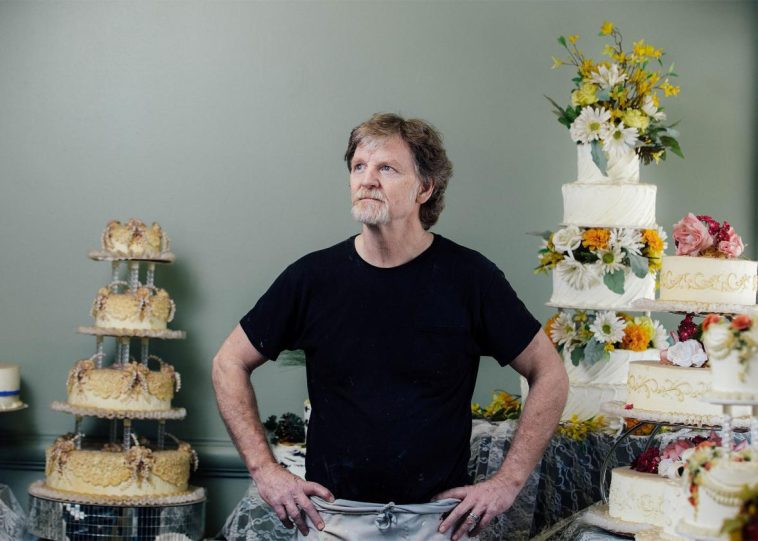An important ruling emerged from the Colorado Supreme Court on a Tuesday, bringing to a halt yet another legal challenge attempting to pin down Jack Phillips, the proprietor of Masterpiece Cakeshop, who has been a beacon of Christian values and traditional principles over the previous 12 years. This lawsuit alleged that Phillips, acting out of his religious beliefs, had discriminated against a transgender lawyer by not agreeing to construct a special cake in honor of the lawyer’s transformative journey.
The force against this legal barrage is none other than Alliance Defending Freedom (ADF), a group of advocates specializing in representing those like Jack Phillips who steadfastly adhere to the dictates of their convictions. ADF’s involvement dates back to 2012 when Phillips became the focus of a lawsuit for his refusal to make a bespoke cake for a same-sex matrimonial ceremony—an act that was in direct opposition to his deeply ingrained beliefs.
Jake Warner, a senior counsel for ADF, declared decisively, ‘Enough is enough.’ Drawing attention to the duration of the struggle Phillips has faced, he maintained, ‘For well over a decade, Jack has been paraded through countless courtrooms. There comes a time when it must end.’ Indeed, Warner’s words seem to underline the need for a relief from the legal warfare Phillips has endured for years.
Emphasizing the universality of the freedom of speech, Warner added, ‘The right to express openly is not reserved for a segment of the populace. As upheld by the U.S. Supreme Court in 303 Creative, the power of the state is not inclusive of compelling artists to communicate messages contradictory to their convictions.’ This principle was the heart of the case—the attorney insisted that Phillips craft a special cake carrying a celebratory message for a gender transition from male to female.
The contention here is that the cake, by its very nature, conveys a potent message—one that Phillips could not support, going against the conservative ethos he holds dear. Therefore, Warner asserted, ‘The government cannot penalize Jack for declining to articulate that message.’ The significance of the matter is that the First Amendment indisputably protects such a decision, safeguarding the right to practice one’s beliefs.
The verdict by the Colorado state court wasn’t an outright acknowledgment or refutation of Phillips’ First Amendment rights. Nevertheless, the case was dismissed on the basis of a technical misstep. The argument brought forth was that the plaintiff did not adhere to proper legal procedures when launching this lawsuit in Colorado.
This lawsuit does more than just involve a particular plaintiff and defendant; it surfaces a broader, deeply entrenched question within the constitution that has become a hotbed of public discourse. How should public authorities strike a balance between safeguarding transgender individuals from potential discrimination in public facilities and upholding the traditional values held by religious business owners within the public marketplace?
Following the first interaction, the attorney reached out a second time, enquiring whether Phillips would agree to make another specialized cake. This one was not just unique but audacious, picturing Satan enjoying marijuana—geared to ‘rectifying the mistakes of thinking.’ Once more, Phillips courteously declined the requests—these cakes’ messages were not in alignment with his innermost convictions.
Such repeated requests from the same attorney inevitably led to the filing of the most recent lawsuit, which carried with it an implicit threat to continue this pattern of legal challenges, setting out to ‘teach Phillips a lesson’ until he gives in. However, these efforts have seemed to mischaracterize Phillips and his bakery as discriminatory or exclusive.
While Phillips consistently stands by his principles, he nevertheless upholds a spirit of hospitality. His bakery, like an open door, welcomes all people irrespective of their background. Rooted in his artistic identity, he likes to evaluate requests for customized cakes based on what the confection will symbolically represent or express rather than narrowly examining the individuals making requests.
This case underlines the significance of principles and the extent to which some individuals are willing to go to uphold them. Moreover, it also emphasizes the necessity to address the increasingly complicated issues around freedom of speech and conscience in the current day-to-day societal dilemmas.
Lessons can be gleaned from this legal journey as well. It reminds us time and again that the rights to adhere to one’s core beliefs should always be protected, and despite the societal changes and debates around it, there needs to be a space that embraces everyone’s right to express or decline to express.
This case between Phillips and the attorney, though now dismissed due to a procedural fault, still represents a much bigger conversation—the delicate balance between individual rights versus societal acceptance, between personal belief and societal assumption. And it serves as a reminder that these debates aren’t going away anytime soon.
Also, it points out the skinned-knee reality that the market should be a place that respects individual values and choices, which include the personal struggles and beliefs of the business owners. Whether anyone agrees or disagrees with Phillips, his unwavering insistence on his fundamental rights for over a decade is indeed worthy of note.
In the end, as the dust of the lawsuit settles down, it leaves behind profound thoughts and questions for us all to ponder: How can we, as members of this diverse society, continue to respect and mix the cocktail of characteristics, beliefs, persuasions, and life choices that define us all, without undermining or entirely stripping away the individual threads that weave this intricate societal fabric?


